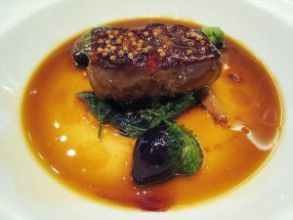AG Harris challenges reversal of CA foie gras ban
by James Poulos | February 9, 2015 5:04 pm
 Just two days before[1] the deadline, California Attorney General Kamala Harris’ office filed notice the state would challenge U.S. District Judge Stephen Wilson’s January ruling that federal law preempts the state’s ban on serving foie gras.
Just two days before[1] the deadline, California Attorney General Kamala Harris’ office filed notice the state would challenge U.S. District Judge Stephen Wilson’s January ruling that federal law preempts the state’s ban on serving foie gras.
The phrase in French means “fatted liver” and comes from a goose or duck that is force fed to produce the delicacy. The case is named after the main plaintiff, based in Canada, the Association des Eleveurs de Canards et d’Oies du Quebec[2] vs. Harris.
Harris’ office declined to comment on the filing. But advocates of maintaining the ban were quick to weigh in, beginning with Paul Shapiro, the Humane Society’s vice president of farm animal protection. According to Reuters, he claimed[3], “California has the right to prevent the commerce in such a cruel and inhumane product.”
That’s anything but certain. As the Los Angeles Times reported[4], the plaintiffs who challenged the foie gras ban expressed certainty that constitutional law was on their side. They said:
“We’re very confident that the district court’s judgment will be upheld on appeal. The decision was based on the simple fact that, in the field of meat and poultry, federal law is supreme. California does not have the right to ban wholesome, USDA-approved poultry products, whether it’s foie gras or fried chicken. We look forward to having our victory affirmed by the Ninth Circuit Court of Appeals.”
The Ninth Circuit, however, took up the issue before[5]. In 2013, it turned back an injunction by out-of-state farmers to put the California ban on hold until the matter could go through the courts.
That raises the possibility that the ban will be upheld again, triggering an appeal to the U.S. Supreme Court.
Facing federal law
As CalWatchdog.com previously reported[6], Wilson ruled the ban ran afoul of federal poultry regulations — specifically, the Poultry Products Inspection Act, or PPIA. He wrote:
“This issue boils down to one question: whether a sales ban on products containing a constituent that was produced in a particular manner is an ‘ingredient requirement’ under the PPIA. California cannot regulate foie gras products’ ingredients by creatively phrasing its law in terms of the manner in which those ingredients were produced.”
The ban arose in 2004, after then-State Sen. John Burton, D-San Francisco, introduced Senate Bill 1520. The bill prohibited foie gras from being produced or sold in California, thereby ruling out imports of the fattened-liver delicacy. Wilson’s decision approved the importation and sale of foie gras, but did nothing to alter California’s prohibition on production.
The perils of prohibition
However the legal case against the ban may fare in higher court, observers have taken note of the practical effect of foie gras prohibition. Much like America’s experiment with alcohol Prohibition, 1920-33[7], banning foie gras appeared to increase Californians’ appetite for what was banned.
As Josh Barro detailed[8] at the New York Times, demand for foie gras rose precipitously both immediately before and after the ban:
“‘We saw an up in volume two years ago when the ban went into effect,’ said Ariane Daguin, chief executive of the specialty food supplier D’Artagnan, which sells to both restaurants and consumers. ‘People wanted to see what the brouhaha was about. Now what is happening is all the chefs who are our friends and have been buying other things from us want to put foie gras back on the menu.'”
What’s more, as Robin Abcarian reported[9] in the Los Angeles Times, fattened liver “never truly disappeared from menus.” Chef Ken Frank, a big foie gras proponent, told Abcarian he “skirted the ban by giving customers foie gras, randomly delivered, he said, with a note explaining the gift was a protest.”
Although he insisted he “went to great lengths not to violate the letter of the law,” Frank himself has been dragged into court by the Animal Legal Defense Fund, which brought suit against him and his restaurant in March 2013.
- before: http://www.latimes.com/local/abcarian/la-me-0123-abcarian-foie-gras-20150123-column.html
- Association des Eleveurs de Canards et d’Oies du Quebec: http://www.scotusblog.com/case-files/cases/association-des-eleveurs-de-canards-et-doies-du-quebec-v-harris/
- claimed: http://www.reuters.com/article/2015/02/04/usa-california-foiegras-idUSL1N0VE35820150204
- Los Angeles Times reported: http://www.latimes.com/business/la-fi-foie-gras-appeal-20150204-story.html
- took up the issue before: http://blogs.findlaw.com/ninth_circuit/2013/09/ban-stands-no-foie-gras-duck-force-feeding-in-cali.html
- reported: http://calwatchdog.com/2015/01/08/federal-judge-strikes-down-ca-foie-gras-ban/
- Prohibition, 1920-33: http://www.history.com/topics/prohibition
- detailed: http://www.nytimes.com/2015/01/20/upshot/how-forbidding-foie-gras-increased-the-appetite-for-it.html?_r=0&abt=0002&abg=0
- reported: http://www.latimes.com/local/abcarian/la-me-0123-abcarian-foie-gras-20150123-column.html
Source URL: https://calwatchdog.com/2015/02/09/ag-harris-challenges-reversal-of-ca-foie-gras-ban/